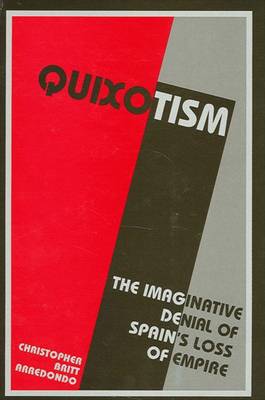
Door een staking bij bpost kan je online bestelling op dit moment iets langer onderweg zijn dan voorzien. Dringend iets nodig? Onze winkels ontvangen jou met open armen!
- Afhalen na 1 uur in een winkel met voorraad
- Gratis thuislevering in België vanaf € 30
- Ruim aanbod met 7 miljoen producten
Door een staking bij bpost kan je online bestelling op dit moment iets langer onderweg zijn dan voorzien. Dringend iets nodig? Onze winkels ontvangen jou met open armen!
- Afhalen na 1 uur in een winkel met voorraad
- Gratis thuislevering in België vanaf € 30
- Ruim aanbod met 7 miljoen producten
Zoeken
€ 43,95
+ 87 punten
Omschrijving
Quixotism explores how a group of Spanish intellectuals, writing during the time of Restoration Spain (1876-1931), incorporated the figure of Don Quixote into an on-going debate on Spanish national and imperial decadence and used this figure to promote a nationalistic and jingoistic formula for national-imperial regeneration. Commonly known as the Generation of '98, these writers turned Spain's military defeat at the hands of an emerging American empire into a moral victory. Christopher Britt Arredondo uses the term Quixotism to denote a premodern heroic ideal centered on the figure of Don Quixote as he explores these writers. Here, he shows how Ganivet turns Quixote into a spiritual conquistador; Unamuno, into a tragic messiah; Maeztu, into a smiling priest; and Ortega, into a paternalistic master. Quixotism is a new critical category of political and cultural relevance, not only for fin-de-siècle Spain and the National-Catholic Spain of the Franco era, but also the democratic, postmodern Spain of today.
Specificaties
Betrokkenen
- Auteur(s):
- Uitgeverij:
Inhoud
- Aantal bladzijden:
- 274
- Taal:
- Engels
- Reeks:
Eigenschappen
- Productcode (EAN):
- 9780791462560
- Verschijningsdatum:
- 30/12/2004
- Uitvoering:
- Paperback
- Formaat:
- Trade paperback (VS)
- Afmetingen:
- 152 mm x 229 mm
- Gewicht:
- 226 g

Alleen bij Standaard Boekhandel
+ 87 punten op je klantenkaart van Standaard Boekhandel
Beoordelingen
We publiceren alleen reviews die voldoen aan de voorwaarden voor reviews. Bekijk onze voorwaarden voor reviews.











